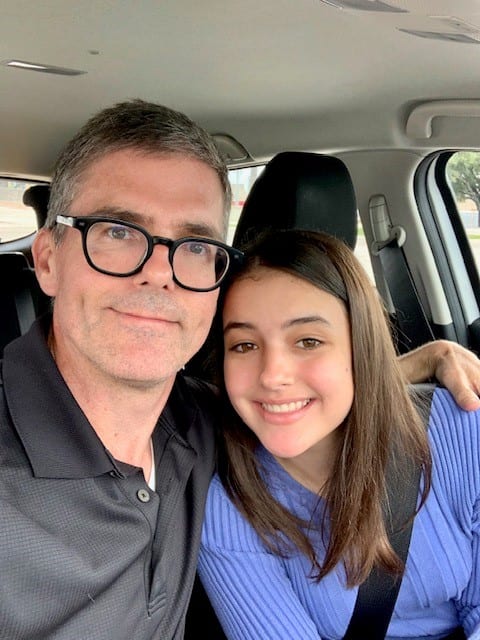
May 25, 2020
Dear Meredith,
Earlier this evening, as you worked on your middle school graduation speech, I listened and watched with a full heart.
After rehearsing an idea, you’d pause, look up toward the ceiling, and then, peering back at the screen, tap quickly on your laptop’s keys. The tip of your tongue protruded slightly between your lips as you picked up the pace. That’s always been your “tell,” how I know you are deep in thought.
It took me back to when you were about 5 years old. That’s when we started our practice of talking about meaningful things as I sit at the foot of your bed. Then and now, you are wiser than your years.
Now 14, you are about give the Commencement speech. Wow! What an honor.
And what a difference a year makes.
Last year at this time, in a different school, you ran into a buzzsaw of adolescent betrayal. And you chose not to dwell on others’ actions but to focus on who you want to be.
You often joke about my liking philosophy and quoting philosophers, so here I go.
A 19th century German philosopher named Friedrich Nietzsche once wrote this: “What doesn’t kill me makes me stronger.”[1] This might not always be true; after all, it can be hard to see how strength could follow from the most severe hardships we face.
On the other hand, I think Nietzsche was right to recognize that people have the ability to build something called resilience, to bounce back from a difficult experience or crisis and to be as strong, or stronger, than ever before—to be resilient.
We talk a lot about resilience in social work, and even teach classes at Texas on how to help people build more of it for themselves as they grow. It’s a good thing to have, no doubt.
As you read your speech to me, I realized that you were talking about this kind of growth, about resilience. You spoke about opportunities for growth shared by all of the 8th graders graduating and heading to high school, and opportunities for any of us, really, who need to bounce back from painful or disorienting experiences.
This is what you said.
“It is so important to continue to be kind, compassionate, and welcoming to others no matter where you are. The world needs more peacemakers, advocates, creators, and thinkers. So wherever you go, I hope you will bring the values apparent here [at this school] with you; values such as kindness, compassion, advocacy, creativity, curiosity, a passion for learning, and a commitment to making the world a better place. Please treat others the way you want to be treated. As high school students, we will continue the journey of deciding what type of people we want to be, and what contributions we want to make to the world. I truly hope that among your many contributions, integrity, respect, justice, and equity will be prevalent.”
You concluded with these words: “Take a moment and think [about] where you’re going. Wherever your path takes you, I urge you to remember the values that are so prevalent here. Remember, as Mahatma Gandhi said, ‘You must be the change you want to see in the world.’”
I want to say thank you, my love. What you shared about your hard experience last year, and how you talked about it motivating you this year, well, it taught me some things about living and growing, including with Parkinson’s.
- Life does not always go as planned.
- Disappointments and heartaches can paralyze us or motivate us.
- Growth can follow setbacks.
- When facing adversity, we do well to focus on our strengths.
- The world needs more peacemakers, advocates, creators, and thinkers.
- Integrity, respect, justice, and equity are timeless and essential values, no matter our age.
- We have to be the change we want to see in the world.
- We are never too young, or too old, to be this change.
- You can learn a lot from a kid.
Your reflections also reminded me of something Michael J. Fox has said, “One’s dignity may be assaulted, vandalized and cruelly mocked, but it can never be taken away unless it is surrendered.”
I’m proud of you.
Love,
Dad
P.S. Remind me to tell you about Aristotle.
_________
[1] Friedrich Nietzsche, Twilight of the Idols (New York: Hackett, 1997), 6.
Shared with permission from Meredith Cole.
Photo by David Wirzba on Unsplash

Allan Cole is a professor in The Steve Hicks School of Social Work at The University of Texas at Austin and, by courtesy, professor of psychiatry in the Dell Medical School. Diagnosed with Parkinson’s in 2016, at the age of 48, he serves on the Board of Directors at Power for Parkinson’s, a non-profit organization that provides free exercise, dance, and singing classes for people living with Parkinson’s disease in Central Texas, and globally via instructional videos. He also serves as a Community Advocate for ParkinsonsDisease.net, writing columns about living well with Parkinson’s. He is author or editor of 10 books on a range of topics related to bereavement, anxiety, and spirituality. Currently, he is writing a book on counseling people with Parkinson’s disease, which will be published by Oxford University Press. Follow him on Twitter @PDWise.
